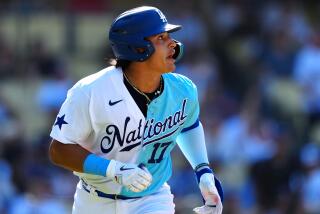Attorney Says Dodgers Erred
- Share via
Major league baseball’s policy regarding Cuban players is two-pronged:
* Clubs are not allowed to scout, sign or negotiate with players in any country they cannot enter and do business.
* Native players can be scouted at any location outside their country “so long as all clubs have access to scout those players.”
If that second aspect seems to require that the 30 major league teams be notified and that a mass tryout be conducted for every defecting player, it is not at the heart of allegations by two Cuban minor leaguers that they were signed illegally by the Dodgers, according to Los Angeles attorney Steve Schneider. He represents first baseman Juan Carlos Diaz and outfielder Josue Perez in association with Gus Dominguez.
Dominguez raised the tryout issue in an October interview with The Times, saying the signings were illegal because the players had been prevented by the Dodgers from contacting an agent and had not received comprehensive exposure in a publicized tryout.
Schneider, however, said Tuesday that the central claim stemmed from the Dodgers’ involvement in the “exportation of the players from Cuba.”
Although hesitant to discuss the allegations while the commissioner’s office is conducting an investigation into the charges by Diaz and Perez, Schneider said that the principal rule violation, as claimed by the players, involves “the Dodgers’ conduct in going into Cuba and taking the players out, arranging for their residency in the Dominican [Republic] and their signing privately.”
He said that although the “failure to hold a tryout is frustrating to the player in that it may limit his bargaining power, you basically get to that second issue only if the commissioner’s office rules against the first.”
If the Dodgers are found to have violated the rule prohibiting scouting in Cuba, the club could face fines, suspensions or loss of draft choices.
The Dodgers could also be found to have violated a 36-year-old trade embargo prohibiting U.S. companies from conducting business in Cuba.
Individuals can be fined up to $55,000 for violations, corporations up to $250,000.
Diaz, currently with the Dodgers’ double-A team in San Antonio, received a $65,000 bonus when signed in the Dominican Republic by Dodger Vice President Ralph Avila and regional scouting supervisor Pablo Peguero in 1996. Perez, who is with the club’s Class A team in Vero Beach, received a $40,000 bonus when signed in 1998. They are asking the commissioner’s office to declare them free agents.
The man in the middle is Peguero. He told the Boston Globe in a story published last Saturday that he had not been in Cuba for 10 years, but both Diaz and Perez claim in the Globe story that he was the Dodger scout who contacted them in Cuba and orchestrated their departures.
Dominguez, in his interview with The Times in October, also placed Peguero in Cuba in 1995, saying he was there to participate in an old-timers game, was touted on Diaz and other players and ultimately arranged to have Diaz videotaped while playing.
Diaz, also interviewed by The Times in October, never mentioned having contact with the Dodgers in Cuba but implied that it was clear to him the Dodgers had arranged it all once he reached the Dominican.
Neither Peguero nor Avila could be reached Tuesday. The Dodgers have instructed their staff not to discuss the investigation.
A major league official, asked if simply videotaping a game was the same as scouting, laughed and said, “Hypothetically? Of course.”
Sandy Alderson, baseball’s executive vice president, said Tuesday that he did not think the investigation would be resolved soon.
More to Read
Are you a true-blue fan?
Get our Dodgers Dugout newsletter for insights, news and much more.
You may occasionally receive promotional content from the Los Angeles Times.










